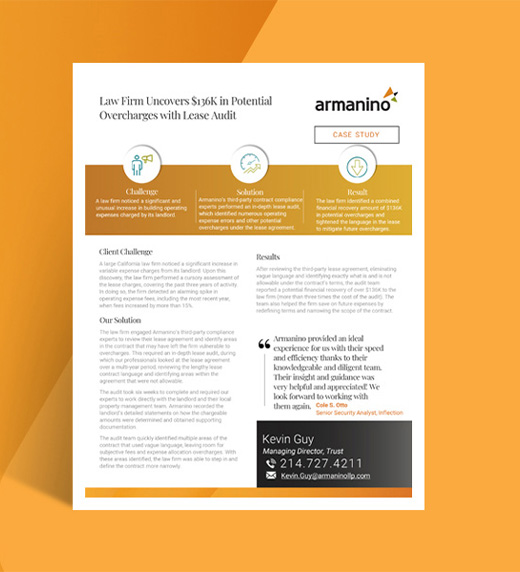
Knox Ricksen, a civil litigation and trial law firm specializing in healthcare and insurance fraud, was at a crossroads due to inefficient accounting processes and tools that hindered its growth and led to missed billings and tax penalties. Working with Armanino’s outsourced accounting, tax and technology experts, the firm digitized accounting tasks, refined tax filing processes and implemented industry-specific analytics software. This enabled them to focus on their core business, reduce unnecessary expenditures and expand to another state.
In 2018, Knox Ricksen LLP — a civil litigation and trial law firm that focuses on complex fraud litigation, whistleblower, personal injury and wrongful death actions — identified inefficiencies in its administrative and accounting functions.
Founded in 1972, the firm employed roughly 30 people in two California locations. Its accounting technology issues stemmed from its business management software, which limited oversight into the accounting department.
“We were dealing with a technology that was difficult and a little archaic,” said firm administrator Lorie Gehrke. “Client billing and expenses weren’t being entered into the system properly and we weren’t able to pull the financial reporting we felt we needed at a time where it was make or break. We either had to get a handle on this or fall behind.”
The reason for alarm was that billing and expenses were being done manually, which made managing the different vendors across the two locations complex and disorganized. As a result, the firm engaged Armanino to take a deep dive into its accounting technology and processes with the goal of cleaning up the books, tightening up processes and positioning it to move forward more successfully into the future.
Armanino — one of the nation’s top 20 CPA and consulting firms — conducted an extensive assessment of Knox Ricksen’s procedures and systems. After strategy discussions, the law firm decided to bring on Armanino as an outsourced accounting team focused on managing the accounts payable and accounts receivable functions.
Additionally, Armanino supplemented Knox Ricksen’s staff in the firm’s billing process. But ultimately, the billing needed to be digitized, specifically physical check writing and processing. To accomplish this, Armanino’s experts helped the firm set up Bill.com, which cut out 99% of the physical check writing and reduced time spent on manual tasks in the billing paying process by 80%, driven by the digitization of approvals and deliveries.
This was the first step in the most complex aspect of the engagement with Armanino — the technology migration off the business management software to a decentralized technology setup. Armanino helped the firm transition to QuickBooks for much of its back-end accounting, the most key process being accounts payable.
To complete the migration off of the current system, Armanino implemented Timesolv for the firm’s time keeping and related billing processes. Armanino also implemented and integrated its proprietary data tool, Analytics for Law Firms, to help Knox Ricksen measure, report and visualize KPIs by attorney, case type, location or client. Gehrke noted how significant this change was compared to its previous solution. “The business management system was cluttered and had years and years of data. Reports were scarce and everything was printed.”
On top of their work to improve the accuracy of the firm’s accounting collection, which reduced tax penalties by helping the firm better track its revenue, Armanino assisted with the tax planning of an equity partner. The team helped verify the accuracy of the returns and expediate payments by helping the firm pay the franchise tax board and IRS directly, removing a major burden from the partner.
Armanino also worked with the firm on crafting a succession planning agreement for its partners, establishing terms that both current and prospective partners could agree upon and defining the firm’s goals over the next five years.
This tax planning and succession work proved important as three other partners became equity partners in 2019. And after collaborating with the major equity partner, Armanino was asked to manage the tax situation for the three others as well. Gehrke put it clearly, “There’s a trust in what Armanino advises us.”
Knox Ricksen’s digital transformation yielded intended bottom-line benefits such as real-time visibility into monthly or yearly financial performance compared to the budget or previous periods; ability to drill down billings by case type, client, location and attorney; and a reduction in manual tasks, tax penalties and uncollected billings. But there were also unexpected improvements realized. With the COVID-19 pandemic forcing the transition to a remote or hybrid work environment in 2020, Gehrke added, “Modernizing operations enabled us to conduct our billing, time keeping and accounts payable processes remotely. It was crucial.”
While the long-term impacts of the global pandemic on business operations are uncertain, what is clear to Knox Ricksen is how improvements in data accuracy boost reporting and will inevitably help the firm. Now, they have greater confidence that their accounts receivable is current, which enables them to more precisely forecast future monthly billings and craft more detailed budgets.
The Knox Ricksen team leverages this more in-depth information to do month-to-month and year-to-year comparisons against their budget. They can also do contingency matters with the AALF tool to drill down comparisons on their most profitable case types’ performance versus the ones that are generally less lucrative but increase the firm’s profile — and make sure they are striking the appropriate balance. Gehrke pointed out, “This is the best thing ever because it’s all right there. It’s all directly tied from our Timesolv data. There are no translation errors. But if there is a problem, it’s easy to trace back where it might be.”
The tool also allows them to quantify an individual attorney’s impact on revenue, and if they were to leave, what the ramifications would be. Thankfully for the firm, there’s been hardly any turnover in the past two years, and they grew by three attorneys and three staff in 2021.
Knox Ricksen opened an office in Dallas, TX, in 2021, which speaks volumes to the firm’s outlook and profitability. While they are still in the beginning stages of establishing themselves as a multi-state firm, the sentiment holds strong that they are in their best position in 30 years.
The past few years, at an administrative and accounting level at least, have been focused on working smarter and more efficiently. The vision going forward is the same. The firm aims to keep profitability strong and grow at a pace that makes sense for them.


